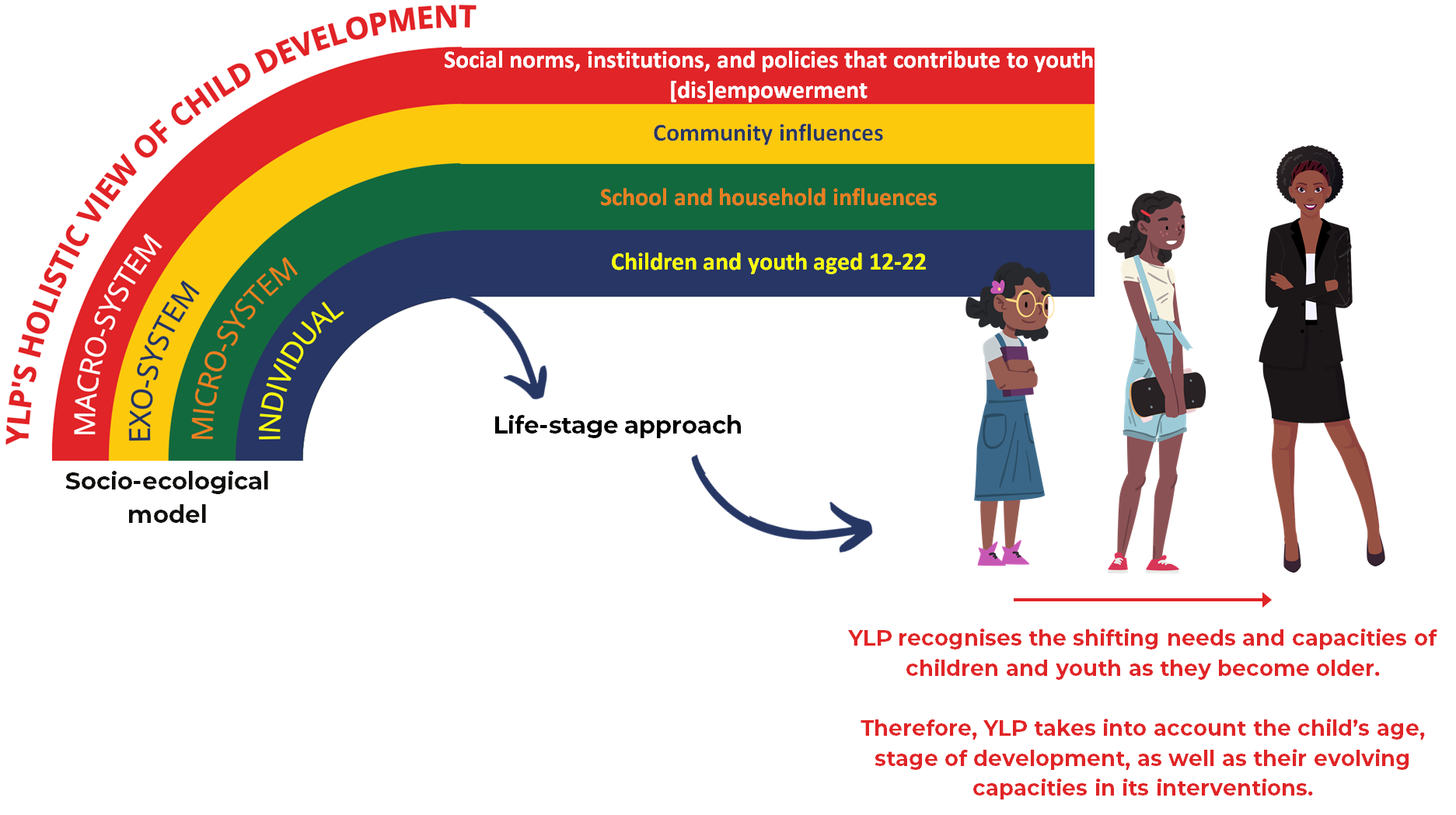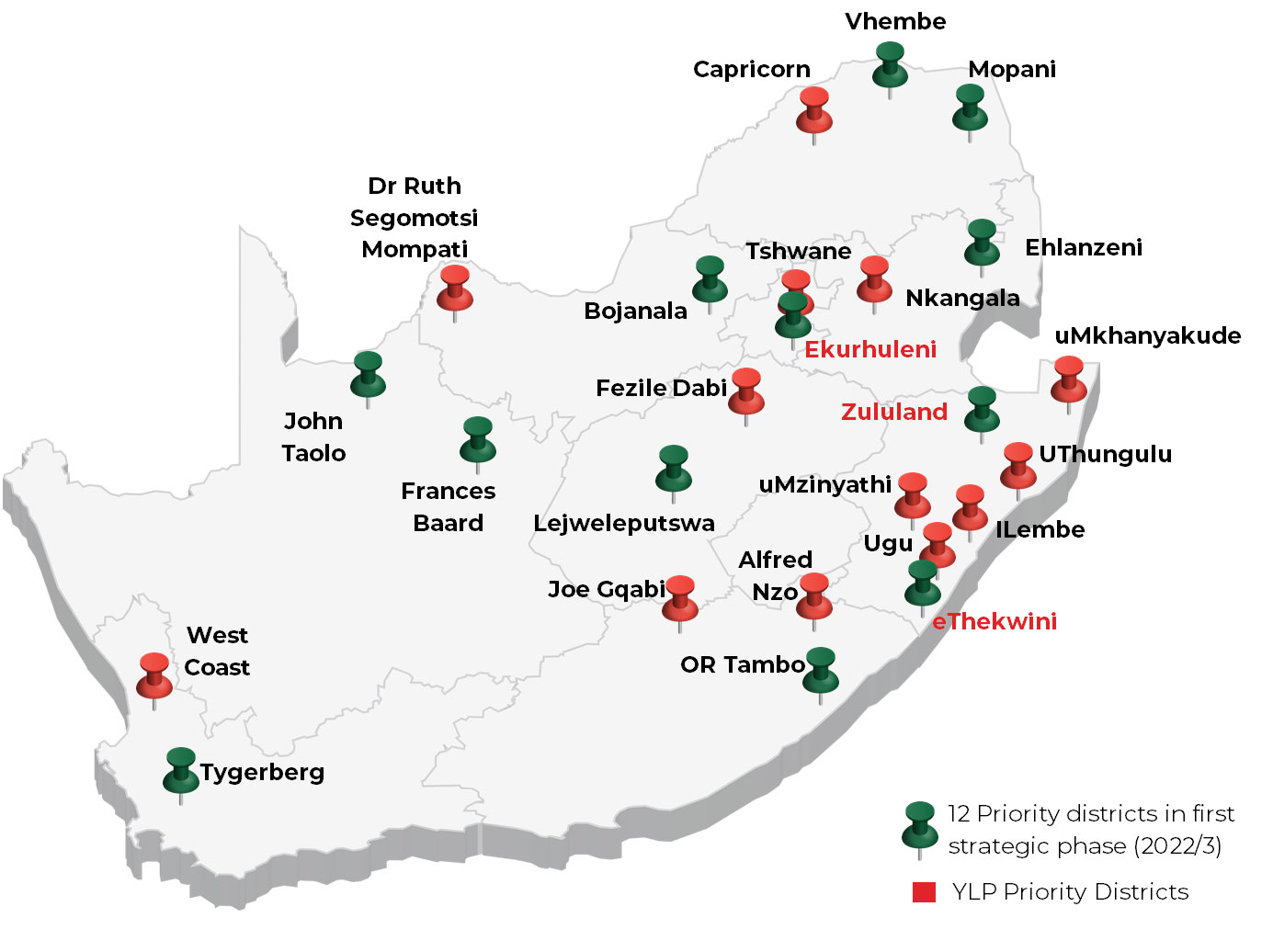Programme Overview
Young people in South Africa face a myriad of challenges, including high unemployment, poverty, education inequality, lack of access to mentorship programmes, and a lack of participation in decision-making processes. The Nelson Mandela Children’s Fund (NMCF) has worked directly with South African youth for more than 20 years through various initiatives, including The Leadership Excellence & Skills Development initiative (2000-2010), Youth for Change (2010-2016), Efeng Bacha (EB) (2002-2021), and Children’s Parliaments (2011-2021). The primary goal of the YLP is to promote youth leadership and entrepreneurship skills, as well as encourage civic participation of South African youth in decision-making processes. This is to be achieved through Efeng Bacha, Legacy Academy, and the Nelson Mandela Children’s Parliament (NMCP). These initiatives are founded upon the belief that if YLP creates platforms for children and youth to develop their skills and engage in advocacy, then this will decrease their vulnerabilities and increase their levels of empowerment.

Programme History
A graphical summary timeline of the YLP for the years 2011 to 2021 is provided below. For further detail on the history of the programme, refer to the YLP Critical Reflection and Review Document (2022)
120 Beneficiaries
– Inception of the NMCP
– First sitting held in Gauteng
240 Beneficiaries
NMCP held in Mpumalanga
240 Beneficiaries
NMCP held in Eastern Cape
300 Beneficiaries
The National Legislature hosted the NMCP as part of 20 years’ celebration of freedom and democracy
360 Beneficiaries
NMCP held in Free State
240 Beneficiaries
NMCP held in North West
240 Beneficiaries
- NMCP held in Northern Cape
160 Beneficiaries
– NMCP held in Limpopo
– Youth summit
390 Beneficiaries
NMCP held in Kwa-Zulu Natal
349 Beneficiaries
– NMCP held in Gauteng
– New EB Cohort
– Children’s Amendment Bill virtual hearings
575 Beneficiaries
– Legacy Academy conceptualised
– Ad-hoc activities
– DSI, North West CSR, Back to School initiative in Makana
– Global conference elimination of child labour
– Mpumalanga Entrepreneurship camp with SLP (Khulisani)
Programme Focus
The NMCF recognises there are numerous challenges the country and its people are facing. The organisation has identified the following most pressing challenges that it would like to contribute towards addressing.
The YLP will focus on addressing the above challenges in the following ways:
Poverty
-
Aims to use training as a vehicle to eradicate poverty
-
Working with SLP
-
Training includes entrepreneurial training and focusses on supporting young people to identify opportunities for entrepreneurship or IGAs; engage in capacity-building; and participate in entrepreneurship programmes (e.g., agricultural).
Child Mortality
-
Through NMCP and with CSDT, youth are encouraged to advocate for the rights of children to have safe spaces, proper nutrition, education, and growth opportunities to reduce child mortality rates
-
This will be done through: lobbying of government to implement policies that will allow for the protection of children; encouraging the development of social entrepreneurship/high impact projects and initiatives; and promoting good nutrition
Youth Unemployment
-
YLP will support pathways towards employment and provide skills development opportunities
-
YLP will also work on the issue of young people being discouraged and strained because of the unavailability of employment by providing psychosocial support
-
Through integration with SLP, there will be organised and legitimate structures like SHGs, and there will be leadership development activities like coaching/mentoring
Violence against Children
-
By advocating for the rights of children to have safe spaces through :
-
Lobbying of government to implement policies that will allow for the protection of children;
-
Identifying opportunities to participate in and advocate for the rights of children
-
Work with CSP
Conceptual Framework
Conceptual frameworks
NMCF places children at the heart of their focus and recognises the fact that children are located within a family and a community which is fundamental to their health, safety, wellbeing, empowerment, and the provision and promotion of their holistic rights and responsibilities. Bronfenbrenner’s (1986) socio-ecological framework views child development as a complex system of interactions at multiple levels of the surrounding environment (from family, friends, schools, and communities) to broader-level values, economics, laws, and policies. Bronfenbrenner (1986) divided a person’s environment into different systems, including the micro-system, exo-system, and macro-system.

Implementing Partners
The identified partners will operate in the priority districts outlined below. As illustrated in the map below, a total of 25 priority districts have been identified for the strategic period (2023-2027). A subset of 12 priority districts will be targeted in the first phase (2023) (green pins) and the remaining 13 priority districts will be targeted in the second phase (2025) (red pins). The priority districts specific to YLP for the first strategic period are shown in red text.
















